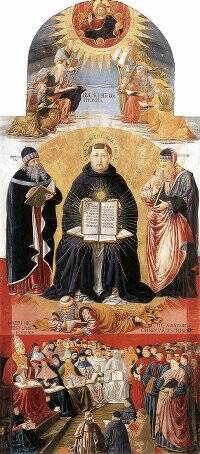In a well-known passage from his Commentary on the Sentences of Peter Lombard, Thomas Aquinas makes a distinction between two different kinds of doctrine, each of which “pertain to the faith” in different ways.
First, there are doctrines that constitute “the substance of the faith in itself” (per se substantia fidei); second, there are doctrines that are “merely accidental” (per accidens tantum).Thomas Aquinas, II Sent., 12.1.2. Whereas the former are non-negotiable truths that all Christian believers ought to accept without qualification (that God is triune, one, etc.), the latter admit of an acceptable diversity of opinion that is on display in the interpretive tradition of the fathers of the church, both Latin and Greek.
Although the Sentences Commentary is Aquinas’s earliest major work, this distinction between “substantial” and “accidental” doctrines is foundational for his approach to creation and his reading of Genesis 1 throughout his long and illustrious career. In order for us to appreciate Aquinas’s views on these matters, we need some sense of the questions to which these doctrines are answers. Therefore we turn to two separate “treatises” in the Prima pars of his great Summa theologiae—first,Aquinas’s theological work was situated in an academic environment characterized by rapid scientific advancement the so-called “Treatise on Creation” (Questions 44–49) and second, the “Treatise on the Six Days” (Questions 65–74). When considered together, these two textual divisions offer a uniquely concise account of Aquinas’s approach to creation and Genesis 1.
As is very much the case for theologians today, Aquinas’s theological work was situated in an academic environment characterized by rapid scientific advancement. In his case, the scientific advancement arose primarily out of Latin translation movements at the end of the 12th and the beginning of the 13th centuries, which yielded tremendous fruit in the form of texts of many genres from great thinkers such as Aristotle, Avicenna, Averroes and Al-Ghazali (among many others). Indeed, much like today, this newfound availability of information occasioned a theological task that was as daunting as it was exciting: how might the Christian theologian synthesize and appropriate the latest and greatest insights of scientific inquiry as they pertain to the articuli fidei—that is, those precious gifts of knowledge born of friendship with the one true God?
The Treatise on Creation
Aquinas’s Treatise on Creation might be understood as a powerful response to such a question. The second article of Question 44 is especially illuminating in this respect, as it involves an explicitly Aristotelian “genealogy” of philosophical positions on the phenomenon of “prime matter”—that is, the common feature of all material creatures insofar as they are subject to the properly material processes of growth and decay. According to Aquinas, the “Ancients” failed to recognize the theistic doctrine of creatio ex nihilo because they could not conceive of creation except by presupposing prime matter as a “pre-existing” substrate from which the immense diversity of the cosmos could be formed and altered. As Aquinas remarks insightfully, these philosophers “considered being under some particular aspect, either as ‘this’ or as ‘such’.”Aquinas, Summa theologiae, 1.44.2. That is to say, while these Ancients correctly grasped that the orderliness of things is derived from some intelligent or formative principle (the mind of a “creator”), the doctrine of creatio ex nihilo dares to penetrate even further into the structure of reality. It is not merely the orderliness of the cosmos that points beyond itself to its creator—although this is certainly true, for Aquinas—it is also the very existence of things as such that serves as the fundamental testimony of the world insofar as it is created. In short, even “prime matter” is created by God.

Triumph of St Thomas Aquinas | Benozzo Gozzoli, 1471
This brings us to the concept of creation itself, which Aquinas tackles head-on in the first article of Question 45: quid sit creatio? (What is creation?) Against objectors who claim that the doctrine of creatio ex nihilo is repugnant to the very notion of creative causality, Aquinas calls upon his reader to appreciate the full implications of God’s creative act with respect to the entirety of created being: “not only must we consider the emanation of some particular being by way of some particular agent, but also the emanation of the entirety of being by way of a universal cause, which is God; and indeed we designate this emanation by the name creation.”Ibid., 1.45.1. Now if creation were from something (however insignificant), presumably this something would have to be, and thus the theologian could not affirm that God is the cause of the entirety of being with intellectual integrity.
There are some important implications here. Note that the doctrine of creatio ex nihilo is not a statement about “how everything got started”; still less is it a claim about the “age of the universe.” Indeed, that is precisely what it is not. Rather, for Aquinas, the doctrine of creatio ex nihilo is a statement about the way in which everything other than God himself exists. Creation is “in the creature,” Aquinas says, precisely as a “relation” of pure giftedness—that is, a relation which is neither “due,” nor “opposed,” nor even “from” anything, at least not anything other than the mysterious gratuity of God’s creative act.Ibid., 1.45.3. In short, for Aquinas, there is no “reason” for God’s creation, at least not in the sense of a reason to which God would be accountable beyond himself.
Once this point about the meaning of creation is understood, it is easier to grasp Aquinas’s well-known reticence to affirm that creation had a temporal beginning simply by the light of natural reason. Creatio ex nihilo as a metaphysical doctrine is silent on the matter, precisely because it is a statement about existence, as opposed to the “history” of what already exists.
These aspects of creation are part and parcel of the substantia fidei—that is, as the essential “grammar” of Christian proclamation. In short, God is intimately present as the creator and sustainer of all things insofar as they exist.
The Treatise on the Six Days
Especially when considered in light of his words on creation itself, Aquinas’s treatment of the “hexameron”—that is, the work of the “six days of creation” recounted in Genesis 1—is rather docile in tone. Strongly reasoned refutations and demonstrations are few and far between. Instead, Aquinas sprinkles his own text with Scripture and carefully ordered glosses from Augustine, Basil, Ambrose, John Chrysostom and Dionysius (among others), illustrating the ways in which “the holy differ in opinion”Ibid., 1.66.1. regarding the literal significance of the six days. Indeed, importantly for Aquinas and other medieval authors, the sensus litteralis of Scripture encompasses a diversity of literary genres, which means that even the “literal meaning” (in the medieval sense) of Genesis 1 is not necessarily a straightforward recounting of events in the past, one after another. Instead, the sensus litteralis of Scripture is God’s intended meaning,Ibid., 1.1.10. “Since the literal sense is that which the author intends, and since the author of Holy Writ is God, Who by one act comprehends all things by His intellect, it is not unfitting, as Augustine says, if, even according to the literal sense, one word in Holy Writ should have several senses.” which is received in different ways according to differing genres of communication. All this to say, the properly historical significance of the creation accounts in Genesis fall under the per accidens tantum category mentioned above—that is to say, again, that they admit of an acceptable diversity of opinion, one that is verified in the diversity of views expressed by the fathers themselves.
Aquinas explicitly regards matters such as, for example, the relationship between “light” and “day” (in Gen. 1:3–5), the meaning of the “firmament” (Gen. 1:6–8), and the production of plant life on the third day (Gen. 1:11–12) as matters of “fittingness” (convenientia) rather than scientific “demonstration” (demonstratio). What this means is that the “necessity” of conclusions reached about these matters—and more importantly, their corresponding degrees of certainty—are not to be confused with the conclusions reached in the demonstrative sciences. Whereas conclusions reached by demonstrative science obtain “always or for the most part,”Aristotle, Physics, II.8. conclusions of fittingness are “necessary” in a less intellectually demanding, but more subtle, “artistic” sense—such as, As does everything else in Aquinas’s theology, this original splendor lies most intimately and palpably in the person of Christ for example, the way in which the ending of a story “fits” or even “had to be” a certain event rather than another. More so than anything else, we might think of Aquinas’s treatment of the six days in precisely these terms, i.e., the terms of the “divine art” (ars divina), which displays the splendor of creation in its original and particular beauty and goodness.
As does everything else in Aquinas’s theology, this original splendor lies most intimately and palpably in the person of Christ:
“[T]he person of the Son is commemorated in the creation of the first things, as well as their distinction and ornateness. . . . But as the formation of works of art is by the form of the art which is in the mind of the artist, which is called the intelligible word itself, so also is the formation of every creature by the Word of God.”Aquinas, Summa theologiae, 1.74.3.
We might say that the “ultimate meaning” of creation, even and especially as it is recounted in the book of Genesis, is summed up in one Word: Christ. To say that everything ultimately answerable in its very being to this Artist’s Word is, so to speak, the essence of Aquinas’s doctrine of creation. Conversely, to be overcommitted to every detail of the Artist’s work is to pretend to know what we do not.
Aquinas’s spirit is one of faithful presence to the biblical text as the word of God—a presence that is rooted firmly in the truths of faith, yet always open to the wonder (admiratio) that God’s magnificent world occasions in and through the sciences.








Comments
Be the first one to make a comment!